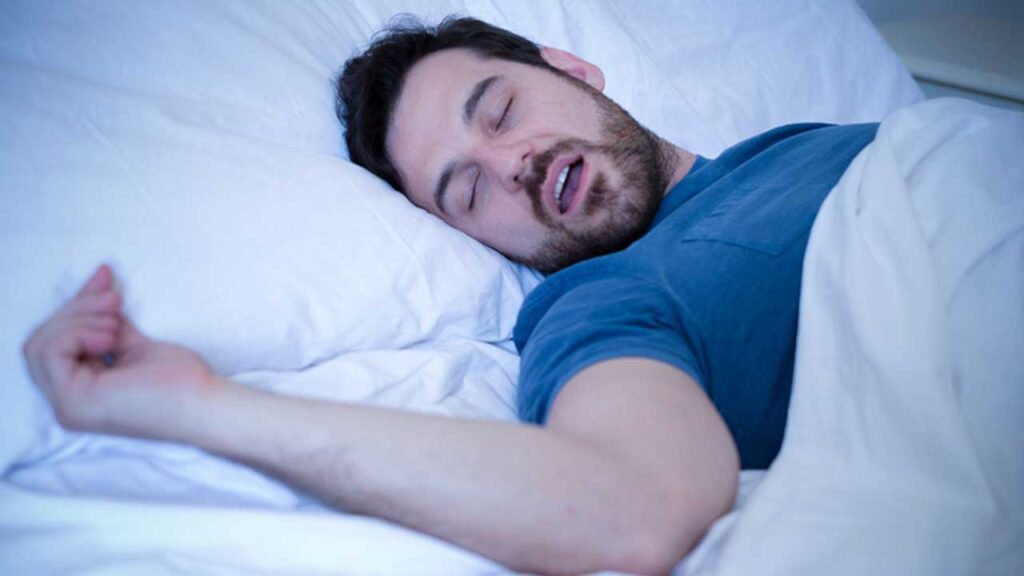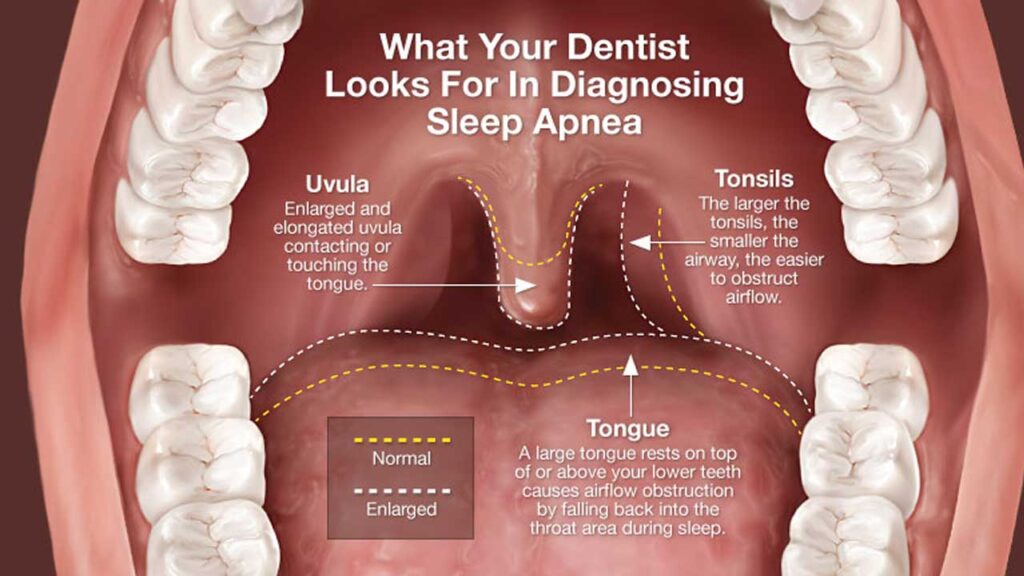Sleep apnea is a serious sleep disorder that affects millions of people worldwide. It occurs when the muscles in the back of the throat relax and block the airway, causing pauses in breathing during sleep. These pauses can last from a few seconds to minutes and can happen dozens of times per hour.
Sleep apnea can cause loud snoring, gasping for air, daytime sleepiness, headaches, mood swings, and impaired concentration. It can also increase the risk of high blood pressure, heart disease, stroke, diabetes, and other health problems.

But did you know that sleep apnea can also affect your oral health? In this article, we will explore the connection between sleep apnea and dental health, and how you can prevent and treat both conditions.
How Sleep Apnea Affects Your Oral Health
Sleep apnea can have a negative impact on your oral health in several ways:
Dry mouth.
People with sleep apnea often breathe through their mouth during sleep, which can dry out the saliva that protects the teeth and gums from bacteria and acids. Dry mouth can lead to bad breath, tooth decay, gum disease, mouth sores, and infections.
Bruxism.
Bruxism is the habit of grinding or clenching your teeth, especially at night. It can be caused by stress, anxiety, or sleep apnea. Bruxism can wear down your enamel, crack your teeth, damage your fillings, cause jaw pain, and trigger headaches.
TMJ disorders.
The temporomandibular joint (TMJ) is the hinge that connects your lower jaw to your skull. It allows you to open and close your mouth, chew, speak, and swallow. TMJ disorders are a group of conditions that affect the function and comfort of this joint. They can cause pain, stiffness, clicking sounds, locking of the jaw, and difficulty moving the mouth. People with sleep apnea are more likely to have TMJ disorders because of the stress on the jaw muscles and the misalignment of the bite caused by bruxism or oral appliances.
Periodontal disease.
Periodontal disease is a chronic inflammation and infection of the gums and the supporting structures of the teeth. It is caused by plaque buildup, poor oral hygiene, smoking, diabetes, and other factors. Periodontal disease can lead to bleeding gums, receding gums, loose teeth, tooth loss, and bone loss. People with sleep apnea are more prone to periodontal disease because of the reduced oxygen levels in the blood, the impaired immune system response, and the dry mouth.
How Dental Health Affects Your Sleep Apnea
The connection between sleep apnea and dental health is not only one-way. Your dental health can also influence your sleep apnea in some cases:
Obstructed airway.
Some dental problems can contribute to the obstruction of your airway during sleep. For example, if you have a large tongue, a small jaw, an overbite, or crooked teeth, you may have less space for your tongue to rest comfortably in your mouth. This can cause your tongue to fall back into your throat and block your breathing.
Oral infections.
Oral infections such as tooth abscesses or gum abscesses can cause swelling and inflammation in your mouth and throat. This can narrow your airway and make it harder for you to breathe during sleep.
Allergic reactions.
If you are allergic to certain materials used in dental work or oral appliances, you may experience an allergic reaction that causes swelling or irritation in your mouth or throat. This can also affect your breathing during sleep.
How to Prevent and Treat Sleep Apnea and Dental Health Problems
If you have sleep apnea or suspect that you do, you should consult with your doctor and dentist as soon as possible. They can diagnose your condition and recommend the best treatment options for you.
Some of the common treatments for sleep apnea include:
Positive airway pressure (PAP) therapy.
This is the most effective and widely used treatment for sleep apnea. It involves wearing a mask over your nose or mouth that delivers pressurized air into your airway to keep it open during sleep.
Oral appliances.
These are devices that fit inside your mouth to reposition your jaw or tongue forward to prevent them from blocking your airway during sleep. They are usually custom-made by a dentist who specializes in sleep medicine.
Surgery.
This is a last resort option for people who have severe or life-threatening sleep apnea that does not respond to other treatments. Surgery may involve removing excess tissue from the throat or nose, repositioning the jaw or tongue, or implanting a device that stimulates the nerve that controls breathing.
Some of the common treatments for dental health problems include:
- Oral hygiene. This is the foundation of good dental health. You should brush your teeth twice a day, floss daily, and rinse with an antibacterial mouthwash. You should also visit your dentist regularly for checkups and cleanings.
- Restorative dentistry. This is the branch of dentistry that deals with repairing or replacing damaged or missing teeth. It can involve fillings, crowns, bridges, implants, dentures, or veneers. Restorative dentistry can improve your appearance, function, and comfort of your teeth and mouth.
- Orthodontics. This is the branch of dentistry that deals with correcting the alignment and bite of your teeth and jaws. It can involve braces, aligners, retainers, or surgery. Orthodontics can improve your smile, speech, chewing, and breathing.
- Periodontics. This is the branch of dentistry that deals with treating the gums and the supporting structures of the teeth. It can involve scaling and root planing, gum grafting, bone grafting, or flap surgery. Periodontics can prevent or treat gum disease and tooth loss.
Sleep apnea and dental health are closely related. Sleep apnea can cause or worsen dental health problems, and dental health problems can cause or worsen sleep apnea. Therefore, it is important to take care of both your sleep and your oral health to prevent serious complications and improve your quality of life.
If you have any questions or concerns about sleep apnea or dental health, you should talk to your doctor or dentist. They can help you find the best solutions for your individual needs.

